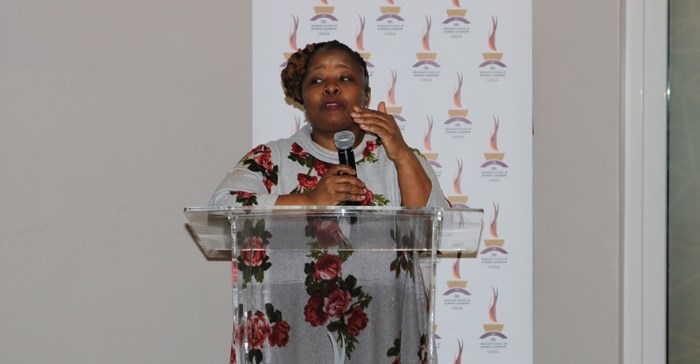
Subscribe & Follow
#AfricaMonth
In the news

Women in leadership - what does race, gender, class have to do with it

Contributing to the conversation were Mpho Letlapa, executive director at Lethusaneng Advisory Services; Tshegofatso Senne, writer and digital content creator; Dr Thuthula Balfour, head of health for the Minerals Council South Africa; as well as Lihle Ngobozi, PhD candidate at Rhodes University. The session was facilitated by Professor Peliwe Mnguni and Dr Esther Makhetha, a postdoctoral fellow from Unisa SBL.
Is activism enough?
Dr Letlapa kickstarted the conversation by quoting Zanele Mbeki’s statement that feminism should be defined as democracy without patriarchy. Letlapa urged women to critique their positions on gender and race discrimination. “Discrimination is wrong and bad but what are we doing about it? Women are conscious activists but in practice we need to move away from being activists to just being people living a life where there’s harmony and no patriarchy; where there are roles, but where these neither advantage nor disadvantage the other.” Letlape argued that there is a way in which women can “do the right things but do them differently for us to eliminate gender, race and class discrimination” and challenged women academics to undertake research in this regard.
Exploring perceptions
Tshegofatso Senne shared her research about deaf women and the challenges they experience in society. She said that deaf women experience double stigma. “For so long deaf women have been fighting for deaf rights given that they are faced with greater oppression and more challenges than hearing women in terms of education, domestic violence and healthcare.”
For example, Senne said that her research revealed that in a deaf school, children were not taught sign language, and thus were denied the right to be taught in a language they understand. When it comes to domestic violence, deaf women often don’t report their cases because they cannot communicate to the police in a way that they can be understood. Senne challenged the perception of disability. “A lot of deaf people don’t consider themselves to be disabled. They believe they are a minority language user, with their own culture and the fact that they cannot hear does not keep them from living normal lives. And yet, because we don’t have the ability to communicate with them we consider deaf people to be disabled.”
Dr Balfour highlighted a media article that described the perception of the working conditions of black professionals in South Africa as being unattractive and challenging. She said, “As women, we’ve come very far in the professional space. Women are powerful, we need to know ourselves and what drives us, always trust our instincts and be the best we can be in challenging environments where we are faced with gender inequalities.”
The matriarchal power of influence
Ngobozi focused on matriarchal authorities and how they provide a space to understand what leadership means to the ordinary black South Africa woman. She referenced the longest standing matriarchal body in South Africa, the women’s manyano (union) which fought patriarchy in the church. Ngobozi said, “These women display leadership qualities that fall outside the framework of business leadership. Despite their socio-economic context and lack of education, these women are nonetheless leaders in the context of their groups. What we learn from women’s manyano is how women are able to use motherhood and womanhood to harness the environment in a way that influences the people around us.”
Professor Mnguni concluded that conversations such as this were critical to challenge the patriarchal viewpoint which undervalues the contribution of women. “We need to consistently be having these conversations in order to drive change to ensure that we are able to leave an authentic legacy for our children.”















